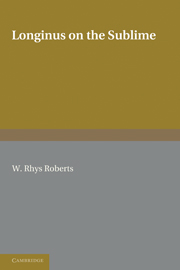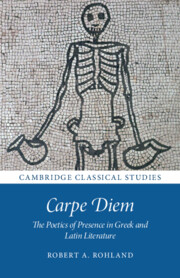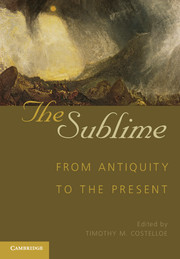The Sublime in Antiquity
$40.99 (C)
- Author: James I. Porter, University of California, Irvine
- Date Published: December 2020
- availability: Available
- format: Paperback
- isbn: 9781108994125
$
40.99
(C)
Paperback
Other available formats:
Hardback, eBook
Looking for an examination copy?
If you are interested in the title for your course we can consider offering an examination copy. To register your interest please contact collegesales@cambridge.org providing details of the course you are teaching.
-
Current understandings of the sublime are focused by a single word ('sublimity') and by a single author ('Longinus'). The sublime is not a word: it is a concept and an experience, or rather a whole range of ideas, meanings and experiences that are embedded in conceptual and experiential patterns. Once we train our sights on these patterns a radically different prospect on the sublime in antiquity comes to light, one that touches everything from its range of expressions to its dates of emergence, evolution, role in the cultures of antiquity as a whole, and later reception. This book is the first to outline an alternative account of the sublime in Greek and Roman poetry, philosophy, and the sciences, in addition to rhetoric and literary criticism. It offers new readings of Longinus without privileging him, but instead situates him within a much larger context of reflection on the sublime in antiquity.
Read more- Proposes a new history of the sublime in antiquity that is virtually coextensive with Greek and Roman thought, from Homer to Cicero to the Neoplatonists
- Provides a set of tools and methods (including thematic and logical markers) for identifying the sublime in the absence of its explicit mention or denomination by a pair of terms, hupsos and sublimitas
- Offers a first attempt at a global reconstruction of the sublime on a large scale: its history, its reception, and its concept
Customer reviews
Not yet reviewed
Be the first to review
Review was not posted due to profanity
×Product details
- Date Published: December 2020
- format: Paperback
- isbn: 9781108994125
- length: 712 pages
- dimensions: 230 x 150 x 36 mm
- weight: 1.02kg
- contains: 8 b/w illus. 2 tables
- availability: Available
Table of Contents
1. Introduction: the sublime before and after Longinus
2. The art and rhetoric of the Longinian sublime
3. The sublime before Longinus in rhetoric and criticism: Caecilius to Demetrius
4. The sublime before Longinus in rhetoric and literature: Theophrastus to Homer
5. The material sublime
6. The immaterial sublime
Conclusion.
Sorry, this resource is locked
Please register or sign in to request access. If you are having problems accessing these resources please email lecturers@cambridge.org
Register Sign in» Proceed
You are now leaving the Cambridge University Press website. Your eBook purchase and download will be completed by our partner www.ebooks.com. Please see the permission section of the www.ebooks.com catalogue page for details of the print & copy limits on our eBooks.
Continue ×Are you sure you want to delete your account?
This cannot be undone.
Thank you for your feedback which will help us improve our service.
If you requested a response, we will make sure to get back to you shortly.
×






